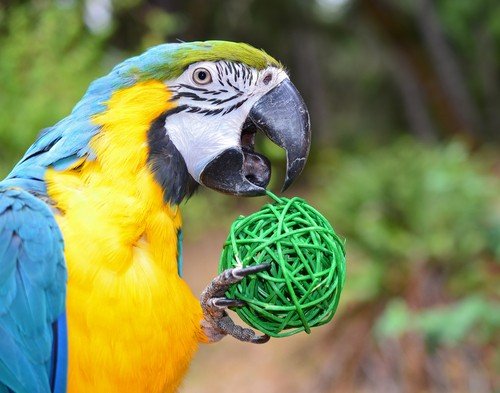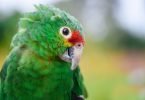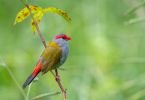When you return home after a long day at work only to land up in a mess caused by bird chewing, you have every reason to fret! Bird owners, especially parrot owners, are well aware of this! The worst part is when birds chew on furniture and leave a mess around.
Keeping a bird could be daunting. While many people like to believe that birds are low maintenance pets, think again. They can chew on anything, create holes in furniture, make noises, and often express their discontentment. If you are experiencing the same thing and you want to prevent and stop bird chewing, click here.
It’s certainly overwhelming at times, but bird chewing is a natural instinct. All you can do is try to train your bird to make them understand that chewing is not good. However, in order to give proper training, you must understand why birds chew or bite.
Why Does my Bird Chew on Everything?
Bird chewing is a natural and instinctive behavior. Birds use the power of their beak to chew on everything. They nest holes in trees in the wild, or your furniture when indoors. Chewing is a natural way to keep their beak trim and fit.
You may be surprised to know that providing the right opportunities to your bird to chew is also important. It is necessary to make sure they know what to do with the beak, such as eating, preening, climbing, nest building, defense, and other activities.
When a bird has the drive to chew, give them a suitable object such as a bird chewing wooden toy. If they do not get something suitable to chew on, they would pick up something else. Sometimes, you may be surprised to see your birds chewing feet, bird chewing tail feathers, or bird chewing nails. If caged, you may also notice your bird chewing on cage bars.
Birds may even chew on items within the homes such as doors, furniture, molding, and baseboards. Unsupervised chewing may be dangerous to birds if they chew on toxic plants or live electric cords.
Although it may not be possible to stop a bird’s desire to chew, it may be possible to re-channel them towards an appropriate object like leather chew toys, destructible wooden chew toys, foraging toys, natural perches, cuttlebone, and calcium blocks.
Understand that bird chewing is a natural habit, which benefits birds and provides a way to release excess energy. Birds can also alleviate boredom by chewing. You should aim to provide acceptable chewing items or outlets for the benefit of your bird’s mental as well as emotional wellbeing and your peace of mind.
However, if bird chewing is deterrent, or you are failing to manage the habit, you must try to train your bird to stop chewing. Learn more here.
Why do Birds Chew?
While some birds chew, others bite. They may do it either way too. However, you must note that there is always an underlying cause of frequent bird chewing and biting.
For instance, if your bird is chewing on cage bars repeatedly, it could be a signal that the bird does not want to be caged. You can set it free to see what it does.
Likewise, if the bird is chewing feet, it is quite normal. But make sure it does not bite the feet to cause bleeding. That would be a deterrent sign of bird chewing. Some of the common reasons for bird chewing include:
Hormonal Factors
A common cause of bird chewing is a hormonal surge. Like all other animals on this planet, parrots have their needs and wants too. When their desires are not met, they usually become frustrated. Especially when it is their breeding season, birds may show signs of constant chewing and biting.
Human Triggers
You could be a trigger. Yes, the fact is that when you are stressed and you approach the bird, they can sense it, and that might trigger chewing or biting. It is their way of responding to stress and anxiety. Shaking may be another sign of stress or nervousness in birds.
Response to Punishment
When you raise your hand to shoo the bird or toss an object on the bird using your hands, it scares them. When they are scared, it is only common to chew. Birds do not understand your approach; whether your approach is friendly or to punish them is often confusing. As a defense, you may notice the bird chewing tail feathers or nails, or they may be eager to bite.
Showing Dislike
When a bird does not like what we are doing, they may express their dislike by chewing. It is the same response as humans. For example, if someone touches you and you do not like it, you would express your dislike and tell that person to stop. Likewise, when animals don’t like something that we are doing, they may express their dislike by chewing themselves or trying to bite us. It is one of the primary causes of leading animals to bite.
Territorial Behavior
Animals are protective of their habitat as well as offspring. Birds are equally protective. They may try to chew up or bite something when they sense danger.
Self-defense
Biting and chewing are self-defense mechanisms for birds. This is mainly the case with unsocialized or abused birds. As people might have hit those birds with their hands, they may be extremely afraid of human contact. It takes a lot of time as well as effort to regain the trust of such birds.
Tiredness/Injury/Illness
When birds are tired, injured, or ill, they may chew more than they usually do. Birds become cranky when they are unwell. They need at least 12 hours, without any interference or disturbance, to rest completely. During this time, if you try to touch the wound or injured spot, or do not get them enough time to rest, they may respond by chewing vigorously.
They Want Something
When birds want something, they will show it by chewing randomly. Bird chewing on caged bars is one such sign. The bird wants to tell you that it desires something.
Lack of Stimulation
Birds, like all other animals, easily get bored. Since they are highly intelligent, they often experience certain psychological disorders as human beings such as anxiety and depression. Birds try to cope up with their emotions by chewing, biting and destroying. Such behaviors should be investigated to prevent extreme aggression.
Grooming
As birds cannot go to the salon, they may be chewing on cage bars just to groom the beak. The beak grows and flakes continuously. The bars of the cage provide stronger resistance and help shave off those flakes to keep the beak trim and neat. Excessive bird chewing on cage bars, however, can damage their beaks. So, give the birds something that they can chew inside the cage, such as cuttlebones and natural perches.
Dietary Factors
Watch your bird see if it has been chewing on cage bars to retrieve the leftover of a delicious meal. It could be a small fruit or honey seed stick. If that were the case, the bird would stop chewing once the food is over. At other times, birds chewing on cage bars could be a sign of mineral deficiency in diets. Female birds need more calcium than males typically. Provide them with calcium-rich cuttlebone to make sure they get enough minerals.
Causes of Birds Chewing on Feet
While birds chewing feet is a part of their regular grooming, excessive chewing is not. There may be an underlying medical condition such as Polly’s feet. Polly’s feet are a condition in which the feet swell and inflame to cause pain and irritation. Because of discomfort, birds may chew their feet constantly. It is important to determine such conditions and give them the necessary treatment.
Other conditions include
Insidious Infections
Birds may suffer from fungal, bacterial, or viral infections of the feet, which may lead to raw, inflamed and red feet. Avian herpes virus is the main cause of foot infections in birds. It is a contagious condition, transferred from one bird to another bird by direct contact. Another condition is Bumblefoot, which is caused by a bacterial infection; it may cause the sores to open up, which leads to discomfort. Bumblefoot is not a contagious disease. It is mainly caused by poor nutrition, improperly-sized perches, unsanitary conditions in the cage, and obesity.
Malicious Mites & Allergies
Mite infestations may cause irritation and itching in the feet. These are arachnid pests, which are too contagious. Birds may also have allergic reactions on the skin when they are exposed to residues of tar and nicotine from smoking. If you don’t wash your hand after smoking and touch the bird, it might develop a reaction. Likewise, some perfumes, hand lotions, and soap residue may also trigger an allergic reaction in birds.
Arthritis
Arthritis in birds can cause constant pain and irritation. It affects their joints around the feet, wings, spine, and beak, and makes them uncomfortable. It also affects their soft tissues between the toes and feet to cause swelling and sores. As a result, the bird may constantly be pecking on the feet.
To determine the cause of your bird chewing feet, you must make a trip to the vet for a complete examination. Your vet would check the feet for signs of an infection or even run blood tests to rule out risks of conditions like gout and similar systemic problems.
Emotional Causes of Birds Chewing their Feet
Like humans, birds are also affected by certain psychological and emotional factors, which cause them to develop repetitive and harmful behaviors. Feet chewing, feather plucking and constant shaking are some examples.
Birds are often stressed when their social, physical, and intellectual needs are not satisfied. It increases their anxiety level and may trigger self-mutilation in an effort to release stress and relieve anxiety. When birds realize that their act of self-mutilation releases pain-relieving chemicals from the brain, they become addicted to constant biting and chewing.
Boredom is yet another emotional cause of birds chewing their feet. As a bird owner, you must be creative to protect the bird from chewing and biting. Develop some activities or give wooden toys to keep them occupied.
When your Bird is Chewing Tail Feathers
It’s a frustrating situation!
You bring a bird home and fall in love with its beautiful looks, start learning about its nature, vocalization, and behavior, and admire the blend of colors and feathers. One day, you see the bird chewing tail feathers and plucking them out.
Feather picking is a difficult bird behavior, especially in caged birds. It is an obsessively destructive behavior that may damage the bird’s skin and lead to wounds. If the bird continues to pull its feathers, it would damage the feather follicles and the feathers may no longer grow. It increases the risk of skin damage and may result in life-threatening infections.
Things NOT to do to Stop Bird Chewing
Firstly, it is very important to identify the reason behind bird chewing or biting constantly.
Secondly, you must take necessary measures to stop the bird from chewing.
However, before taking appropriate steps, you must rule out all other possibilities that do not help in dealing with such problems.
Never Confine a Bird
People usually think that giving time out to birds or confining them should work. However, it doesn’t. Since the very start, behaviorists have labeled this to be a flawed argument. Confinement would only make the bird agitated. The chances are that instead of solving the problem, the bird would become more aggressive.
Do Not Clip their Wings
Some proponents opine that clipping bird’s wings could be a solution. The bird would neither be able to fly nor destroy any furniture.
However, this is also not the right approach. Birds are meant to fly for various reasons, especially for escaping from things that seem to be harmful, or when they are taken by surprise or shock.
This clearly means that clipping the wings of the bird would only make it more vulnerable and expose it to all kinds of danger.
Do Not Keep Them in Isolation
Isolating birds or keeping them in another room is no solution to stop bird chewing. Although it may seem to be a brilliant idea, it is the same as caging the bird. They would feel confined and caged.
Birds are playful and loving creatures. Confining them would make them upset and stressful. The bird would also become more detached, which you surely do not want.
Do Not Install a Play Stand
Installing a play stand would not help either. Birds are naturally designed to fly, chirp, and explore the surroundings.
Forcing them to stay in one place can be stressful. It also restricts their physical movement, which becomes quite unhealthy.
Thus, allow them to move freely once during the whole day.
To learn more about how to stop bird chewing, click here.
Tips to Prevent Bird Chewing
Understand Body Language
To prevent bird chewing, you must read the early signs.
Certain physical signs generally precede chewing or biting behavior. For instance, a bird may chew or bite if its desire is ignored. Note some physical signs before the bird becomes aggressive – pinning eyes, fluffing feathers, fanning tail feathers, and flexed wings are a few examples. Some birds may also growl, fluff their feathers, and adopt a head-down posture before they strike.
You must learn to read the bird’s body language to stop them from chewing.
Develop a Bond
Gain your birds’ trust and confidence through affection and care. Spend time taming the bird. You can clip the bird while taming.
Always whisper when you are talking to the bird. Be calm and patient. Understand that your bird could be aggressive unless it knows and trusts you.
Give them Chewing Toys
Bird chewing wooden toys are not harmful. There are many toys designed for bird chewing. Give your bird a toy that it can chew on and play with. Make your bird watch some videos. That way, it may not be much interested in damaging your furniture or other things indoors.
Wooden toys are cheap and can fulfill your bird’s desire to chew on something. It may destroy it.
If your bird has the habit of chewing, you may order wooden toys in bulk.
Be Cheerful & Positive Around the Bird
Try to be cheerful and happy when you are around the bird. Birds chew and bite when they sense negative vides around.
Thus, if you are positive, the bird shall also respond.
Avoid using the hand to punish your bird. Doing so would only make you an enemy of your bird, and it may start showing rebellious behavior like bird chewing furniture.
Accept Bird Chewing
Birds will chew. It is normal. They may be messy too. You may try to train the bird. At the same time, you should accept this behavior. Remember, keeping any pet is a huge responsibility. If you are unwilling to take it, you should not consider keeping pets.






